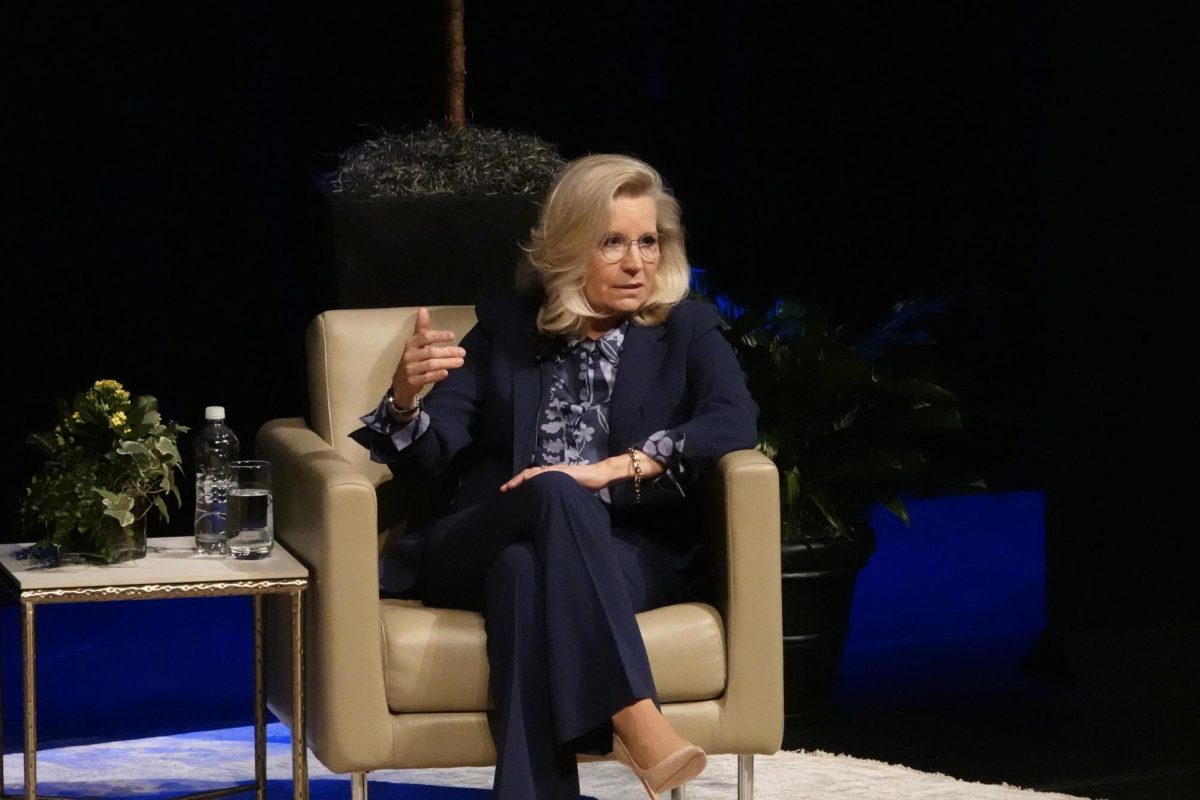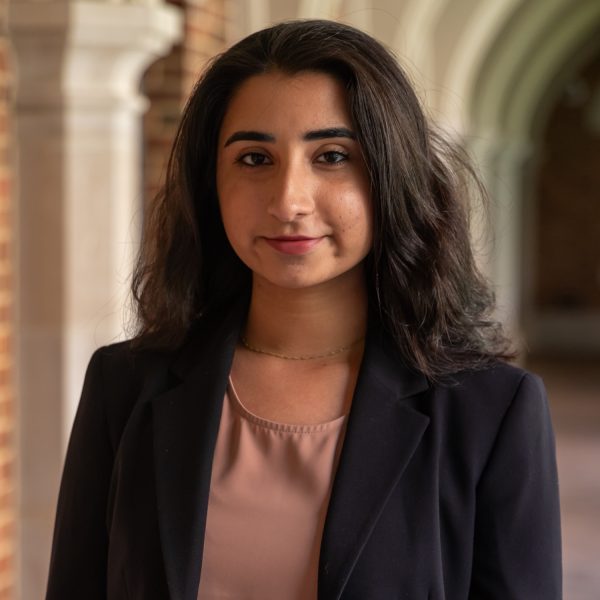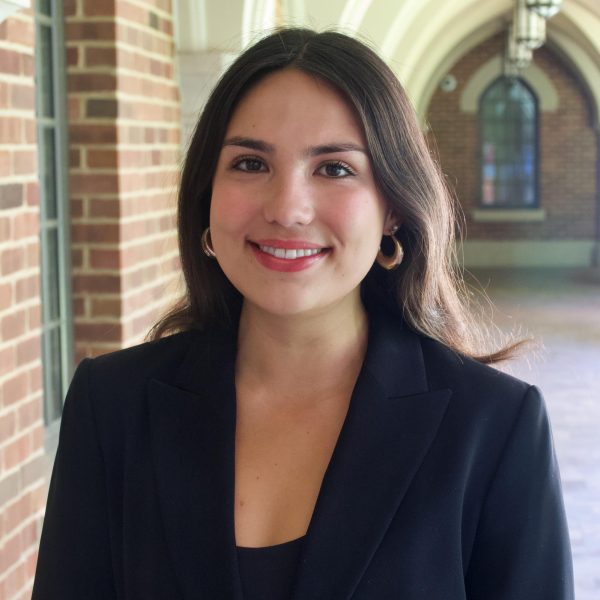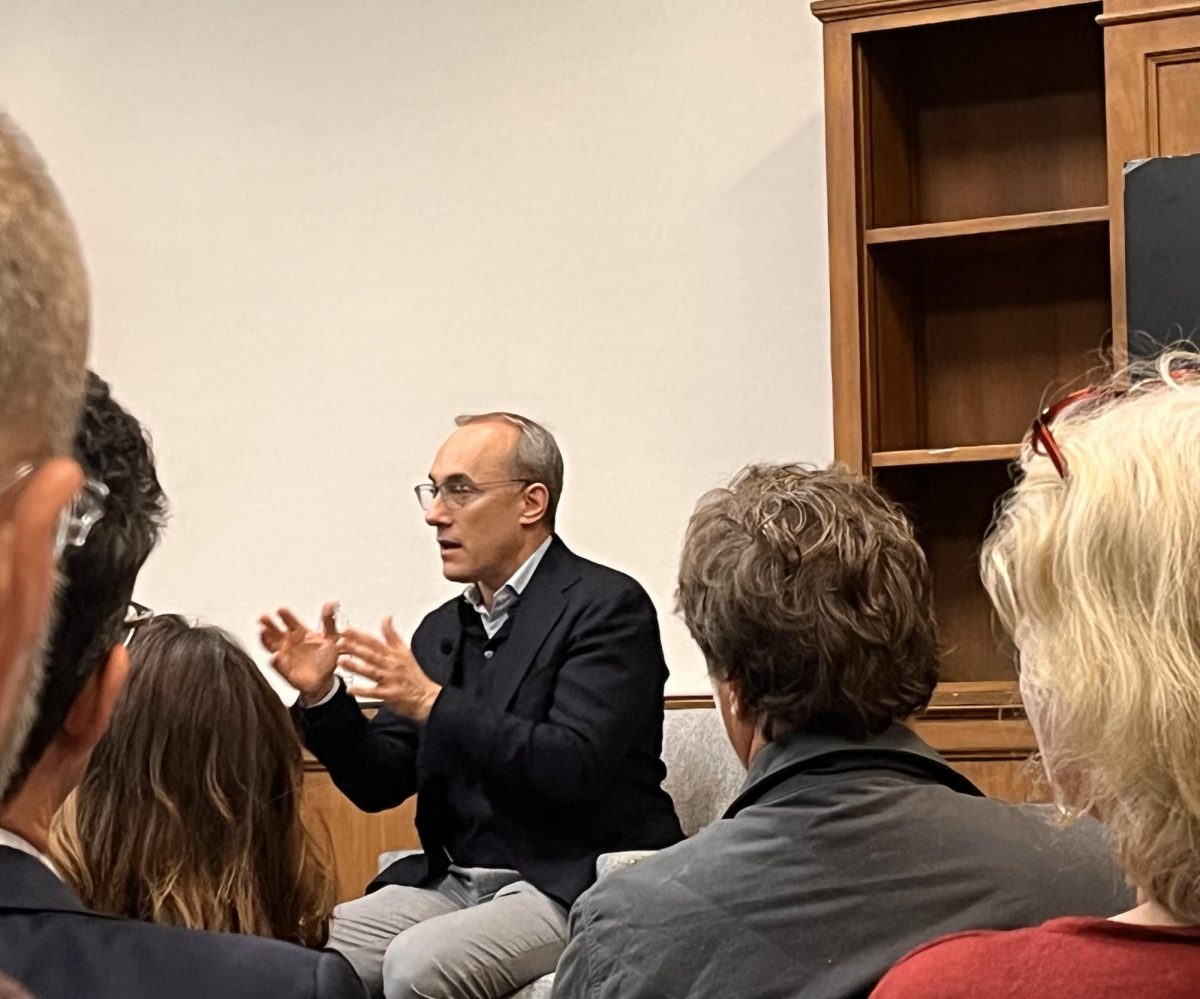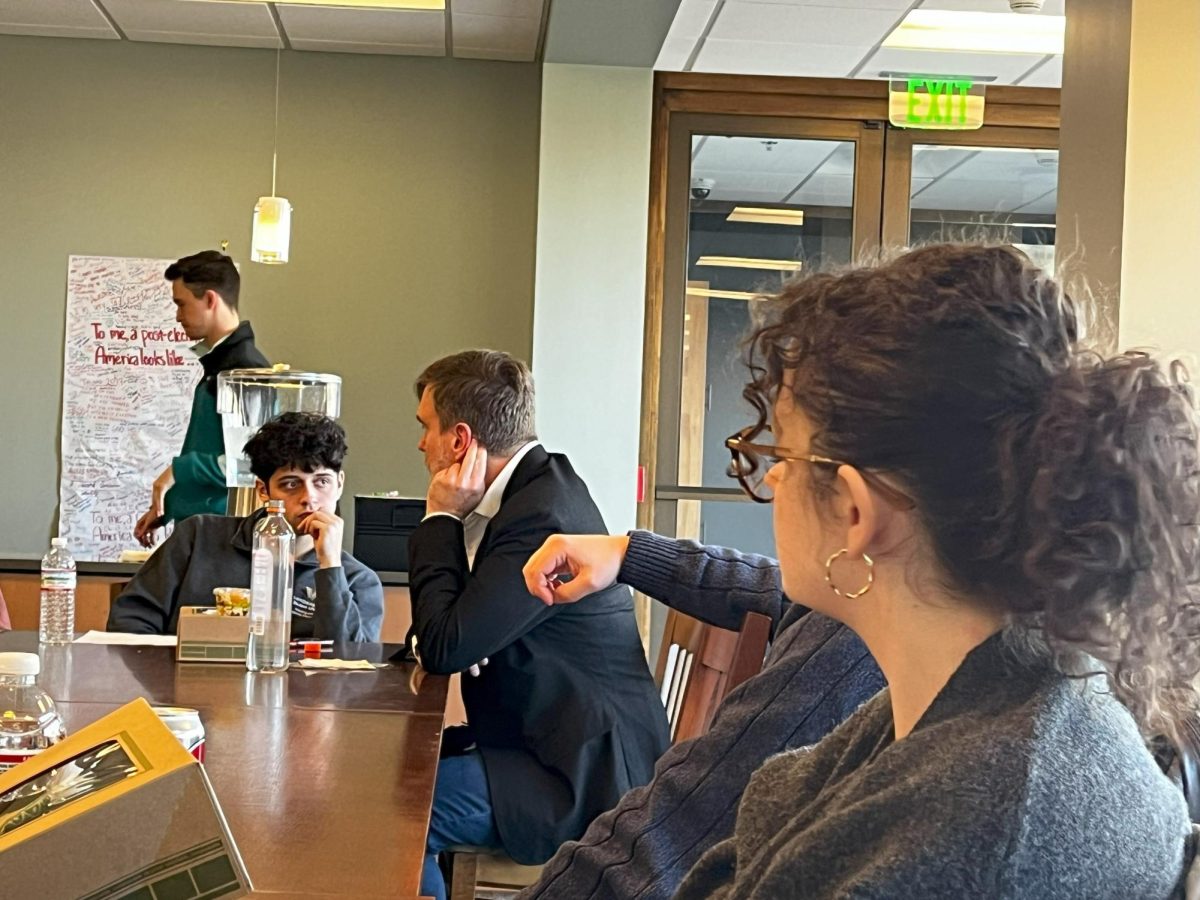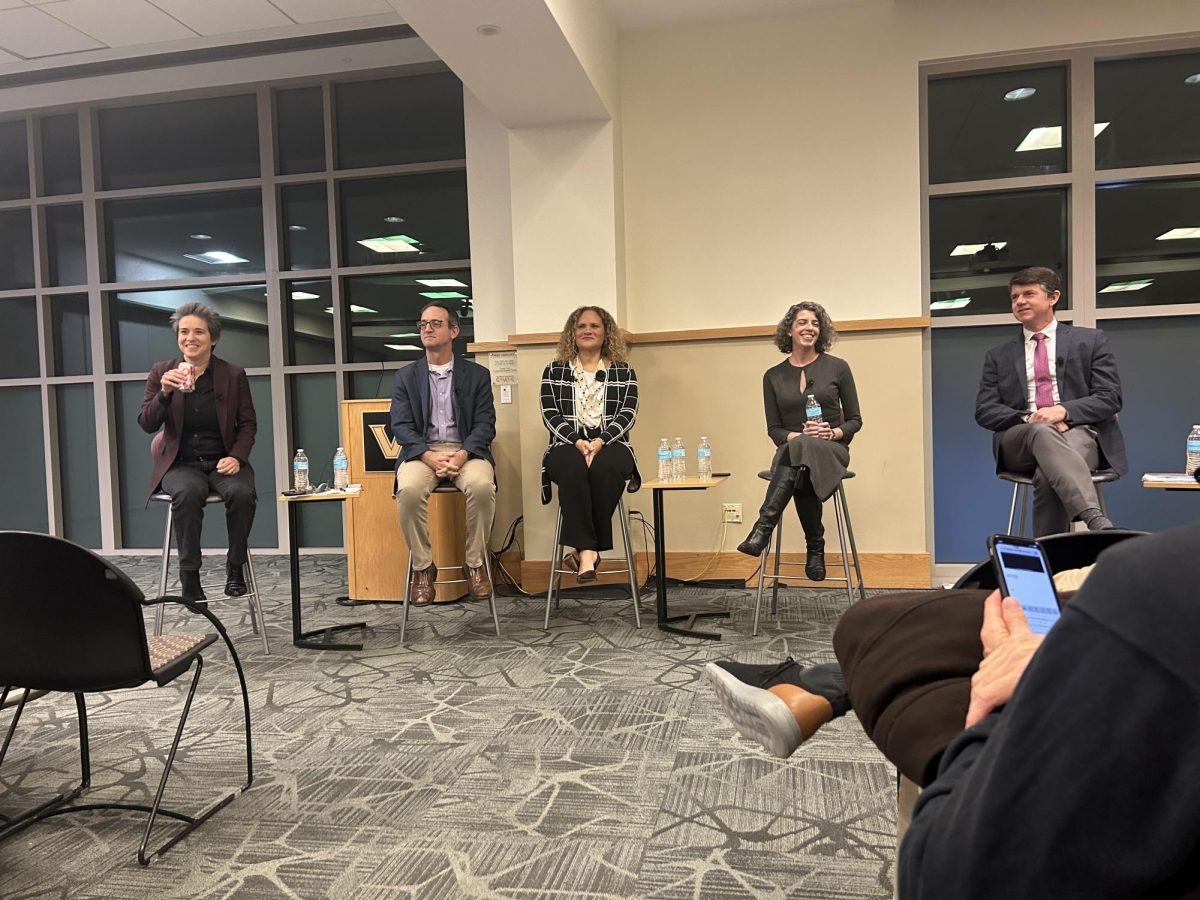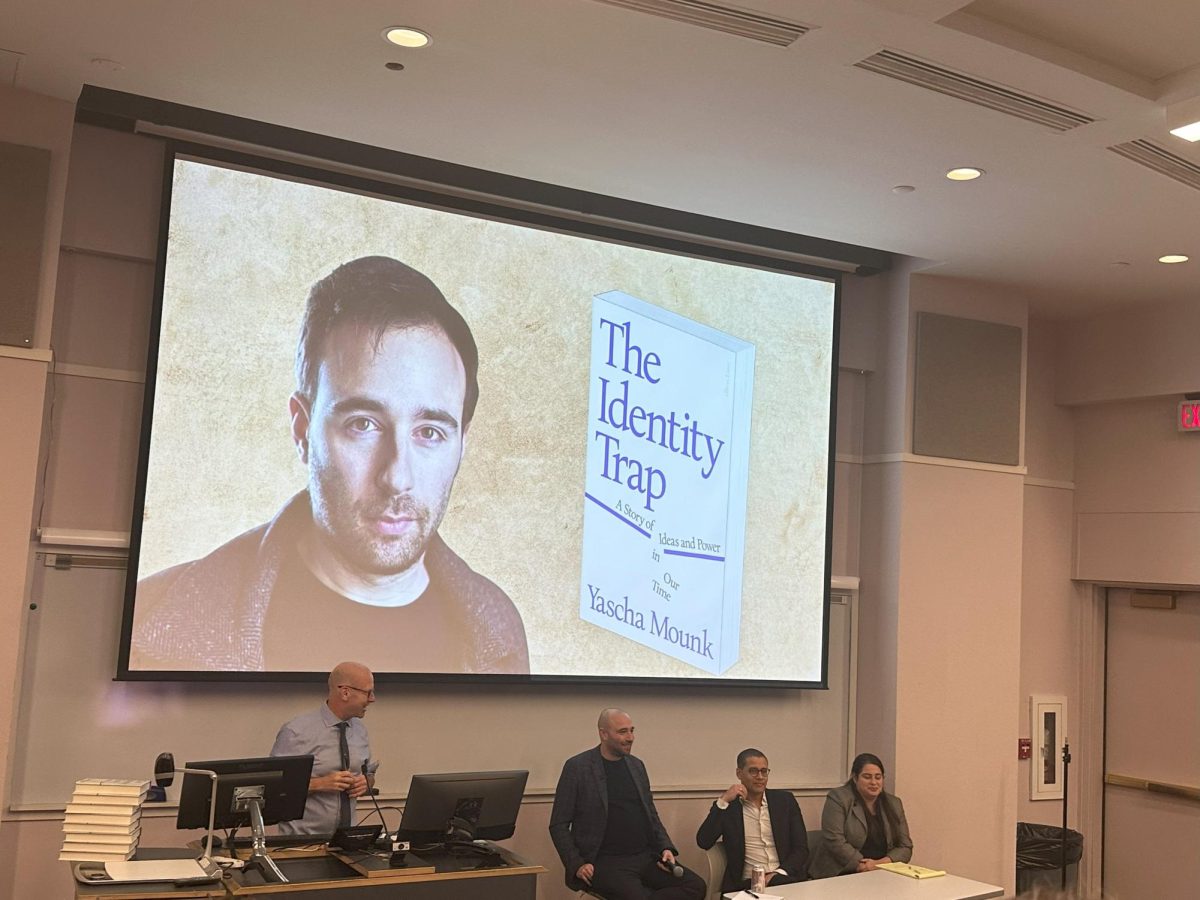Former U.S. Rep. Liz Cheney came to Vanderbilt on Feb. 6 to discuss issues and current events relating to American democracy. Hosted by Dialogue Vanderbilt and the Vanderbilt Project on Unity and American Democracy, the discussion, titled “Defending Our Democracy,” was moderated by Jon Meacham, Pulitzer-Prize winning presidential biographer and distinguished visiting professor at Vanderbilt.
Cheney represented Wyoming’s at-large congressional district in Congress from 2017-23. From 2018-21, Cheney chaired the House Republican Conference, the third-highest position in House Republican leadership. Cheney was also the vice chair of the “Select Committee to Investigate the January 6th Attack on the United States Capitol.”
Chancellor Daniel Diermeier opened the discussion by underscoring the importance of debate and civil discourse on college campuses.
“Tonight, we must recommit to the challenging work of engaging in respectful discourse, listening to one another and remaining united around those shared values despite our differences,” Diermeier said. “This is essential at a university no less than in a democracy.”
Diermeier called attention to Cheney’s reputation as a prominent Conservative voice against Trump. Cheney was one of 10 House Republicans who voted to impeach Trump following the insurrection on Jan. 6, 2021. In May of that year, Cheney was ousted from leadership for her continued criticisms of Trump.
“Our guest tonight, former U.S. Representative Liz Cheney, is, of course, one of the most compelling recent examples of debate and dissent and the courage it requires of us,” Diermeier said.
Cheney’s account of Jan. 6, 2021
Meacham asked Cheney to set the scene for the Jan. 6, 2021 attacks on Capitol Hill. Cheney said she was working on remarks in the House Republican Cloakroom when her father, former Vice President Dick Cheney, made her aware of threats to her safety.
“I was gonna speak during the debate, and my dad called me and he said, ‘Are you listening to President Trump?’” Cheney said.
Despite her father’s concern for her safety after Trump had publicly denounced her for not objecting to the results of the 2020 presidential election, Cheney said she had wanted to go through with her speech.
“I never got to make the remarks because the Capitol was invaded, and the next time I talked to my dad, I was being evacuated,” Cheney said. “But, the main thing I remember feeling was just intense anger that this would happen.”
Cheney relayed the various precautions Capitol Police advised Members to take in case the House floor was breached, which included putting on gas masks and hiding behind the chamber’s bullet proof chairs. She said one of her colleagues gave conflicting advice.
“As I was standing there, one of my colleagues who had some military service, walked over to me after they made the announcement and he said to me, ‘You can’t take cover in here, you won’t be safe. Do not hide behind the chair, if they breach the door, you [have] to run,’” Cheney said.
The emergence of “Trumpism”
Meacham asked for Cheney’s opinion on why the former president became popular among voters in the first place.
“I think there are a whole combination of things that went on, and again, one of the things about Trump is that he taps into something very real,” Cheney said. “He taps into this sense that people feel that they are not heard and has this con man’s ability to convince them that he speaks for them.”
Cheney said that the COVID-19 pandemic also played a role in boosting Trump’s support because people were confined to their homes and had more exposure to misinformation as they spent time online.
“You saw conspiracy theories spread like wildfire, and I don’t know if that would have happened if people had not been sitting at the computer as much as they were,” Cheney said.
Cheney also attributed Trump’s rise in popularity to declining respect for the Constitution by the public and lawmakers.
“It’s not just that we have high school students graduating who don’t know how the Constitution is structured,” Cheney said. “We have members of Congress who don’t know, and they’re usually the ones that carry the Constitution in their breast pocket.”
Cheney called out Trump’s supporters in the Republican Party for legitimizing his attacks on electoral proceedings.
“I think every Republican donor who’s giving him money needs to be held accountable for the fact that they’re giving money to someone who has said, publicly, he thinks we can terminate the Constitution,” Cheney said. “He did attempt to overturn an election.”
2024 presidential election cycle
Cheney agreed with Meacham’s claim that the current state of American politics lacks “two functioning parties,” urging the GOP to reckon with this issue in the upcoming elections.
“We have to hold to account the members of the current Republican Party, and that means recognizing there’s a really clear choice,” Cheney said. “You cannot be both for Donald Trump and for the Constitution.”
Cheney said Republicans need to have a political platform outside of “MAGA” and “America First.” She believes the GOP needs to return to policies favored in the Reagan-era, such as lowering taxes, limiting government and strengthening national defense. In addition to establishing clear policy goals, she said that both parties need to be able to hold intellectual debates.
“We also have to be in a position where we can have a debate where both parties are engaging on substance with the understanding that you’ve got this framework that allows us the freedom to do that,” Cheney said.
Cheney expressed uncertainty that the 2024 election will come down to choosing between Trump and President Joe Biden. She suspects many Republicans who do not support Trump will write in other candidates.
U.S. involvement in Ukraine
Meacham brought up Cheney’s foreign policy credentials — she held several positions in the U.S. State Department — and asked her to speak on global affairs.
“When you look at what has been maintaining peace and security and prosperity in the world since the end of World War Two, it has been American leadership, and American leadership could not have happened without allies,” Cheney said. “None of our adversaries have the alliances that we have.”
Cheney said she is concerned that the U. S. is not as geared toward maintaining these alliances today. She cited the example of declining Republican support for the war in Ukraine.
“This is territory we haven’t seen before, and for the party of Reagan to be leading the charge to lose the war in Ukraine is something that we just have to stop,” Cheney said.
Cheney said that if Putin gets Ukraine, he will attack a NATO ally next, which could require the U.S. to lend more armed support in the region.
“We will find ourselves in a situation where we will have to develop far more resources, potentially the deployment of U.S. forces,” Cheney said. “It is absolutely morally right and right from a security perspective for us to make sure that we continue to support Ukraine.”
Plans for the future
The conversation concluded with Meacham inquiring about Cheney’s plans for the future. Meacham asked if Cheney would run for election again, and she opted to discuss her family life instead. She added that her priorities for the future include visiting college campuses and getting students registered to vote.
“I am going to be working, and I’m going to be spending a lot of time on college campuses, making sure that we’re getting people registered [to vote],” Cheney said. “I think college students hold a huge amount of power in the cycle to make sure they actually get out and vote.”
Junior Emma Lenson said that while she does not agree with Republican policies, she appreciated Cheney’s talk.
“I like that there’s still some people that are choosing the country over party which felt really good,” Lenson said. “I felt like that room was definitely people that were conservative but believed in democracy, which is something you don’t see much of anymore.”
Lenson pointed out that the room was filled with primarily older individuals even though Cheney’s calls to action were largely catered to younger adults.
“She’s saying that the point is to get college students to vote, and I think we were one of 20,” Lenson said.
Cheney’s plans for the future extend beyond college campuses as she also said she will be bringing changes to the GOP after this fall’s elections.
“Once you defeat Donald Trump, I’m going to be very focused on rebuilding a true conservative Republican Party,” Cheney said.

